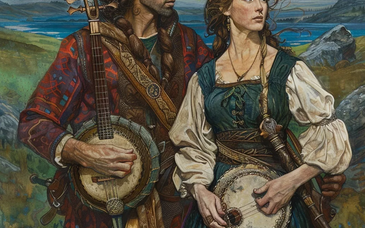510 Expulsion of the last Tarquinian king, Tarquinius Superbus. Brutus liberates Rome. Establishment of a republic headed by two magistrates (later called consuls) elected annually
509 Treaty between Rome and Carthage
507 Consecration of the Temple of Jupiter on the Capitol
504 Migration of the Sabine Claudii clan to Rome
501 Appointment of the first dictator
496 Battle of Lake Regilus between Rome and Latin League
494 First secession of the plebeians on the Mons Sacer, several miles from Rome. Creation of the tribunes of the people.
493 Treaty with the Latins
491 Coriolanus impeached and condemned to exile
486 Wars with the Aequi and Volsci begin (continue with many intervals for the next fifty years)
482-474 War with Veii
479 Veii wins the Battle of Cremera
474 The Greek city-states in Italy win a naval battle at Cumae and crush Etruscan power in Campania
471 Creation of the concilium Plebis. Office of the tribunes officially recognized
457 Aequi win attle at Mt. Algidus. Cincinnatus becomes dictator for sixteen days and rescues remaining Roman army
c. 451 Decemvirs tyrants of Rome. Code of the Twelve Tables lays the basis for Roman law
449 Fall of the decemvirs. Powers of the tribunes defined.
447 Quaestors elected by the people
443 Censorship established
431 Decisive defeat of the Aequi at Mt. Algidus
428 Rome conquers Fidenae (from Veii)
421 Quaestors increased to four, open to plebeians
c. 396 The Roman dictator Camillus conquers Veii, one of the principal Etruscan centers, after long siege. Introduction of military pay. Peace with the Volsci.
390 (or 387!) Romans defeated by the Gauls under Brennus at the Battle of Allia. Gauls sack Rome, only the Capitol is defended by the citizenry
388 Aequi defeated at Bola
386-5 Latins, Volsci and Hernici defeated
381 Tusculum conquered
c. 378 Erection of the Roman city wall traditionally but erroneously credited to King Servius Tullius, who reigned two centuries earlier
377 Latins defeated after their capture of Satricum
367 Lex Liciniae Sextiae: Consulship restored, plebeians admitted to the office of consul
366 First plebeian consul
361 Romans capture Ferentinum
359 Revolt of Tarquinii
358 Treaty with Latins
357 Maximum amount of interest fixed. Falerii revolts. Gauls raid Latium.
356 First plebeian dictator
354 Alliance of Rome and Samnites
353 Caere defeated
351 First plebeian censor
349 Gallic raid checked
346 Defeat of Antium and Satricum
348 Treaty with the Carthaginians
343-1 First Samnite War, Romans occupy northern Campania
340-338 Latin War: Rome conquers the seaport of Antium
338 Latin League dissolved. Many cities granted full or partial citizenship
337 First plebeian praetor
334 Alexander of Macedon begins his eastward campaign
332 Treaty with Tarentum (possibly 303 BC)
c. 330 Colony founded at Ostia
329 Privernum captured
328 Etruria and Campania annexed
326-304 Second Samnite War: Rome increases its influence in southernmost Italy
321 Samnites entrap and defeat Roman army at Caudine Forks. Romans forced to accept a truce. Rome surrenders Fregellae
c. 320 Colonies founded: Luceria (314, Canusium (318), Alba Fucens (303), Carsioli (298), Minturnae (296), Sinuessa (296), thus extending Roman sway into Apulia, the Abruzzi, and southern Italy
315 Luceria captured. Samnite victory at Lautulae. Capua revolts and joins Samnites
314 Roman victory at Tarracina. Capua conquered
313 Fregellae and Sora captured
312 Censorship of Appius Claudius. Via Appia, connecting Rome and Capua, and Aqua Appia begun
310 Treaties with Cortona, Perusia and Arretium
307 Revolt of Hernici
306 Anagnia conquered and granted limited citizenship
304 Aequi defeated. Under the censor Fabius Maximus Rullianus landless new citizens are assigned to four tribes in the city
300 Lex Ogulnia: plebeians admitted to priestly offices
298-290 Third Samnite War: Rome becomes all-powerful in southern Italy
298 Rome captures Bovanium Vetus and Aufidena
295 Roman victory over Samnites, Gauls and Umbirnas at Sentinum
294 Samnite victory at near Luceria
293 Roman victory over Samnites at Aquilona
292 Falerii conquered
291 Venusia conquered
290 The Sabines submit to Roman rule and receive limited citizenship. Peace with Samnites.
287 Lex Hortensia: conflict between social orders placated by conceding same voting rights to all
283 Boii defeated at Lake Vadimo
282 Rome conquers territory still held by the Gauls along the Adriatic, Roman Fleet attacked by Tarentum
280-275 War against king Phyrrus of Epirus
280 Phyrrus lands in Italy and defeats Romans at Heraclea
279 Roman defeat at Battle of Asculum
278 Roman treaty with Carthage. Pyrrhus leaves Italy for Sicily.
275 Pyrrhus returns to Italy but is defeated near Malventum and leaves Italy for good.
272 Surrender of Tarentum
270 Capture of Rhegium
269 Earliest Roman minting of coins
268 Picentes conquered and granted limited citizenship
267 War with Sallentini. Capture of Brundisium
266 Apulia and Messapia reduced to alliance
264 Introduction of gladiatorial shows in Rome. Capture of Volsinii. roman alliance with Mamertines.
264-241 First Punic War: Rome comes to the defence of the Greek cities in Sicily against Carthage
263 Hiero of Syracuse becomes ally of Romei
262 Capture of Agrigentum
261-260 Rome builds fleet
260 Naval virtoy of MylaeCapture of Rhegium
259 Roman occupation of Corsica
257 Naval victory of Tyndaris
256 Naval victory of Ecnomus. Romans land in Africa
255 Romans defeated in Africa. Naval victory off Cape Hermaeum. Fleet wrecked off Pachynus
254 Capture of Panormus
253 Roman fleet wrecked of Palinurus
250 Victory at Panormus. Siege of Lilybaeum
249 Carthaginian naval victory at Drepana
247 Hamilcar Barca begins Carthaginian offensive in western Sicily
241 Naval victory off Aegates Insulae. Peace with Carthage. Occupation of Sicily which is made a Roman province. Construction of the Via Aurelia from Rome to Pisa
238 Romans oust Carthaginians from Sardinia and Corsica
237 Hamilcar goes to Spain
236 Gallic raids in northern Italy
230 Hasdrubal succeeds Hamilcar in Spain
229 First Illyrian War Roman influence established on Illyrian coast
226 Treaty defining river Iberus (Ebro) as border of influence between Rome and Carthage
225-222 Celtic War: conquest of Cisalpine Gaul
225 Invading Gauls defeated at Telamon
223 Flaminius defeats insubres
222 Battle of Clastidium. Surrender of Insubres
221 Hannibal succeeds Hasdrubal in Spain
220 Censorship of Flaminius. Via Flaminia begun
219 Second Illyrian War. Conquest of Illyria. Hannibal captures Saguntum.
218-201 Second Punic War
218 Hannibal crosses Alps and arrives in northern Italy. Battle of Ticinus and Battle of Trebia.
217 Roman defeat at Lake Trasimene. Naval victory off river Iberus (Ebro)
216 Roman defeat at Cannae. Capua revolts.
215 Hannibal in southern Italy. Alliance of Carthage with Philip of Macedon and with Syracuse after death of Hiero. Hasdrubal defeated at Dertosa.
214-205 First Macedonian War
213 Hannibal occupies Tarentum (except for the citadel). Roman siege of Syracuse.
212 Siege of Capura
211 Introduction of the denarius coin. Hannibal's march on Rome. Fall of Capua and Syracuse. Defeat of the Scipios in Spain.
210 Fall of Agrigentum. Scipio lands in Spain.
209 Recapture of Tarentum. Capture of Carthago Nova.
208 Death of Marcellus. Battle of Baecula.
207 Hasdrubal defeated at Metaurus
206 Battle of Ilipa near Seville: Carthaginian rule collapses in Spain
205 Scipio in Sicily.
204 Cult stone of the mother goddess brought from Asia Minor to Rome. Scipio lands in Africa.
203 Scipio defeats Syphax and wins battle of the Great Plains. Hannibal recalled to Carthage. Mago defeated in Gaul.
202 Scipio's victory at Zama. Rome succeeds Carthage as ruler of the western Mediterranean. Aggressions of Philip and Antiochus.
200-197 Second Macedonian War
197 Macedonians war ends with defeat of Philip V by T. Quinctius Flamininus at Cynoscephalae. Spain organized into two provinces. Revolt of Turdenati in Spain. Antiochus occupies Ephesus.
196 Marcus Porcius Cato consul
195 Hannibal exiled, joins Antiochus. Masinissa starts raids on Carthaginian territoty.
192-188 Rome wars against King Antiochus II of Seleucia
191 Antiochus defeated at Thermopylae. Antiochus' fleet defeated off Corycus.
190 The Scipios in Greece. Antiochus' fleet defeated.
189 Antiochus defeated at Magnesia, Campanians enrolled as citizens. Fall of Ambracia. Peace with Aetolia. Manlius raids Galatia/
188 Peace of Apamea means end of war with Antiochus
187 Construction of Via Aemilia and Via Flaminia
184 Cato censor.
184/3 Death of Scipio
183/2 Death of Hannibal
181-179 First Celtiberian War
179 Accession of Perseus to the throne of Macedon
172 Two plebeian consuls in office for the first time
171-168 Third Macedonian War
168 Defeat of Macedonian King Perseus at Pydna
167 Epirus plundered. Macedon divided into four parts, Illyricum into four.
157-155 Campaigns in Dalmatia and Pannonia
154-138 Lusitanian War
153-151 Second Celtiberian War
151 Carthage declares war on Masinissa
149-146 Third Punic War
149 Siege of Carthage begun. Rising of Andriscus in Macedonia.
147 Scipio aemilianus takes Carthage. Macedonia annexed as a Roman province
146 Destruction of Carthage. Africa annexed as a province. Achaean War: Rome wars against the league of Greek cities. Corinth destroyed by the Romans
143-133 Third Celtiberian War (also called Numantine War)
142 Censorship of Scipio Aemilianus. Stone bridge over the Tiber.
137 Defeat and surrender of Mancinus in Spain
135-132 Slave War in Sicily
134 Tiberius Sempronius Gracchus becomes people's tribune in the absence of the Consul Scipio Aemilianus. His assassination in 133 sparks open class conflict in Rome
133 King Attalus II bequeaths Pergamum by Testament to Rome. Scipio Aemilianus sacks Numantia and settles Spain.
129 Death of Scipio Aemilianus. Province of Asia organized.
124 War against Arverni and Allobroges in Gaul
123 First tribunate of Gaius Gracchus
122 Second tribunate of Gaius Gracchus
121 Civil disorder in Rome. Gaius Gracchus killed. Many followers of the Gracchi are executed. Defeat of the Arverni and Allobroges. Gallia Narbonensis becomes a Roman province.
119 Marius tribune. Abolition of the Gracchan and commission.
116 Senatorial commission despatched to Numidia to mediate on succession.
113-101 Cimbri and Teutones invade Roman territories
113 Cn. Carbo defeated at Noreia by the Cimbri
112-106 Jughurtine War
112 Jugurtha sacks Cirta. War declared on Jughurta.
110 War in Africa.
109 Metellus gains some successes against Jughurta
107 Marius elected consul, succeeds Metellus for command in Africa and captures Capsa. Cassius defeated by Tigurini in Gaul.
106 Birth of Cicero and Pompey. Marius advances into western Numidia. Bocchus of Mauretania surrenders Jughurta to Sulla.
105 Cimbri and Teutones destroy Roman armies at Arausio.
104-100 Second Sicilian slave war.
104 Marius consul second time, reorganizes Roman army.
103 Marius consul third time. Land allotments for Marius' veterans. Marius trains army in Gaul.
102 Marius consul fourth time, defeats Teutones near Aquae Sextiae (Aix-en-Provence). M. Antonius sent to Cilicia to deal with pirates.
101 Marius consul fifth time. Marius and Catullus defeat Cimbri at Vercellae (Vercelli).
100 Marius consul sixth time. Rioting in Rome. Marius restores order. Birth of Julius Caesar.
98 Marius leaves Rome for Asia. Revolt in Lusitania
96 Ptolemy Aion bequeaths Cyrene to Rome by testament
95 Mithridates ordered out of Paphlagonia and Cappadocia.
91-89 Social War between Rome and its Italian allies
90 Roman setbacks in Social War. Lex Julia: Latins, Etruscans, and Umbrians remaining loyal to Rome are given Roman citizenship.
89-85 Fisrt Mithridatic War. - War with Mithridates VI of Pontus over his territorial ambitions.
89 Victories of Strabo and Sulla. Lex Plautia Papiria: Roman citizenship conceded to all allies south of the Po.
88 Proposal to transfer command in Asia from Sulla to Marius by tribune Sulpicius Rufus. Sulla seizes Rome. Mithridates overruns Asia Minor.
87 Cinna and Marius in control of Rome, massacre Sulla's supporters. Sulla lands in Greece and besieges Athens.
87-84 Consulships of Cinna
86 Marius consul seventh time, dies. Sulla conquers Athens, defeat Mithridates armies at Chaeronea and Orchomenus.
85 Treaty of Dardanus with Mithridates.
84 Cinna killed. Carbo sole consul.
83-82 Second Mithridatic War
83 Sulla lands in Italy. Murena begins Second Mithridatic War
82 Civil War in Italy. Sulla victorious. Proscribtions in Rome. Sertorius leaves for Spain. Pompeu crushes Sulla's opponents in Sicily.
81 Sulla dictator. Constiturional reforms. Pompey defeats Marians in Africa. Sertorius driven out of Spain.
80 Sertorius lands in Spain again.
79 Sulla resigns dictatorship. Sertorius defeats Metellus Pius
78 Death of Sulla. P.Servilis starts three year campaign against pirates
77 Pompey oppointed against Sertorius
76 Sertorius victorious against Metellus and Pompey
75/74 Death of Nicomededs who bequeaths Bithynia to Rome
74-64 Third Mithradatic War
74 Cyrene made Roman province. M. Antonius given commmand against the pirates. Mithridates invades Bithynia; Lucullus sent against him. 73-71 Third Slave War
73 Rising of Spartacus at Capua. Lucullus relievesCyzicus, defeats Mithridates.
72 successes of Spartacus. Assassination of Sertorius. Pompey victorious in Spain. Lucullus campaigns against Mithridates in Pontus. M.Antonius defeated by pirates of Crete.
71 Crassus defeats Spartacus. Lucullus defeats Mithridates, who flees to king Tigranes of Armenia.
70 First consulship of P{ompey and Crassus. Restoriation of tribunician powers (suppressed by Sulla). Birth of Virgil
69 Lucullus invades Armenia, captures its capital Tigranocerta
68 Mithridates returns to Pontus. Discontent in Lucullus army.
67Pompey handed command against pirates. Pompey clears pirates from the Mediterranean.
66 Pompey given command against Mithridates, who is finally defeated. Pompey campaigns in Caucasus. Birth of Horace.
64 Pompey annexes Syria
63 Cicero consul. Caesar elected pontifex maximus. Seizure of Jerusalem by Pompey. Cataline Conspiracy. Death of Mithridates. Birth of Octavian.
62 Defeat and death of Catalina. Pompey settles matters in the east, returns to Italy and disbands his army.
61 Caesar governor of Further Spain. Revolt of the Allobroges. Aedui appeal to Rome.
60 Caesar returns from Spain, first triumvirate between Casesar, Crassus and Pompey.
59 Caesar consul. Pompey marries Caesar's daughter Julia. Caesar given consulship of Cisapline Gaul and Illyricum; senate adds Transalpine Gaul to this.
58-51 Caesar's campaigns in Gaul
58 Tribunate of Clodius - corn law. cicero exiled. Cyprus annexed. Caesar defeats Helvetii and Ariovistos
57 Clodius and Milo riot in Rome. Return of Cicero. Caesar defeats Nervii and other Belgae
56 Conference of the triumvirs at Luca.
55 Second consulship of Crassus and Pompey. First stone theatre of Rome, built by Pompey on the Campus Martius. Caesar bridges the Rhine, invades Germany, then Britain.
54 Pompey, near Rome, governs Spain through legates. Death of Julia. Caesar's second expedition to Britain. revolt in north eastern Gaul. Crassus prepares for Parthian campaign.
53 Rioting in Rome. Battle of Carrhae: Roman army defeated by the Parthians, Crassus killed, the Roman army standards taken as booty
52 Milo kills Clodius. Trial of Milo. Pompey sole consul. Revolt of Vercingetorix in Gaul. Siege of Alesia, Caesar victorious.
51 Parthian invasion of Syria
49-45 Civil War - Julius Caesar fighting the Pompeians
49 On January 10 Caesar crosses the Rubicon and marches on Rome in defiance of the Senate. Pompey leaves for Greece. Caesar dictator fir first time, for eleven days, passes emergency legislation. Caesar in Spain, defeats Pompeians.
48-47 Caesar becomes involved in Egyptian dynastic struggles
48 Caesar consul for second time.Caesar crosses to Greece, defeats Pompey at Pharsalus. Pompey flees to Egypt where he is stabbed to death on landing. Caesar in Egypt. Alexandrine War. Caesar makes Cleopatra queen of Egypt.
47 Caesar dictator for second time in his absence. Caesar defeats King Pharnaces II of Pontus. Caesar returns to Rome, then leaves for Africa.
46 Caesar crushes surviving Pompeian forces under Scipio and Cato at Thapsus. Caesar dictator second time, consul third time. Cato commits suicide. Caesar returns to Rome, reforms calendar. Caesar leaves for Spain.
45 Caesar dictator third time, consul fourth time. In battle at Munda in Spain the last Roman Republican resistance is crushed
44 Caesar dictator fourth time (for life), consul fifth time. March 15, Caesar murdered by Brutus, Cassius, and their co-conspirators acting for the Republicans. Octavian returns from Greece.
43 Second Triumvirate: Anthony, Octavian, Lepidus. Proscriptions. Cicero is murdered
42 Julius Caesar deified. Sextus Pompeius controls Sicily. Battle of Philippi: the Triumvirate defeat Brutus and Cassius, both of whom take their own lives
41 Antony visits Asia Minor, then Alexandria.
40 Agreement at Brunidisum divides the Roman empire. Antony marries Octavia. Parthian invasion of Syria.
39 Agreement at misenum between Antony, Octavian and Sextus Pompeius. Parthian defeated at Mt Amanus.
38 Naval successes of Sextus Pompeius. Defeat of Parthians at Gindarus. Antony captures Samosata.
37 Pact of Tarentum; triumvirate renewed. Antony marries Cleopatra at Antioch.
36 Octavian granted tribunician immunity. Sextus Pompeius defeated at Naulochus. Lepidus ceases to be triumvir. Antony retreats through Armenia.
35 Octavian in Illyria. Death of Sextus Pompeius.
34 Antony celebrates triumph in Alexandria
33 Octavian consul for second time. Antony in Armenia. Antony and Cleapatra winter at Ephesus.
32 Octavia divorced by Antony. Octavian publishes Antony's will in Rome. Antony and Cleopatra in Greece.
31 Octavian consul third time. (and hereon successivly until 23 BC). September 2, Octavian defeats Antony in naval battle off Actium
30 Tribunician powers granted to Octatian. In August, Antony and Cleopatra commit suicide in Alexandria
29 Octavian celebrates his Triumph in Rome, the doors of Temple of Janus are closed, the war officially ended, many legions disbanded, and land distributed to veterans. Dedication of Temple of Divus Julius.
28 The Senate, its numbers already somewhat reduced by Octavian, grants him the title of Princeps Senatus. Census held by Octavian and Agrippa. Mausoleum of Augustus begun.
27 January 13, Octavian makes the gesture of returning command of the state to the Senate and the people of Rome, receiving in return vast provinces and most of the army as his own. Three days later the Senate confers on him great powers, numerous honors, and the title of Augustus
27-25 Augustus directs the final subjugation of Spain and the administrative reorganization of Spain and Gaul
23 The Senate grants Augustus the titles and powers of Imperium proconsulare maius and tribunicia potestas for life, thereby turning over to him complete control of the State and ending the Roman Republic



